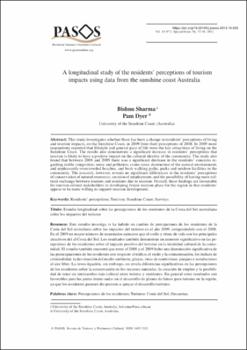A longitudinal study of the residents’ perceptions of tourism impacts using data from the sunshine coast Australia
Date
2012Abstract
Este estudio investiga si ha habido un cambio de percepciones de los residentes de la Costa del Sol australiana sobre los impactos del turismo en el año 2009, comparándolo con el 2008. En el 2009 un mayor número de encuestados opinaron que el estilo y ritmo de vida son los principales atractivos del al Costa del Sol. Los resultados también demuestran un aumento significativo en las percepciones de los residentes sobre el impacto positivo del turismo en la identidad cultural de la comunidad. El estudio también encontró que entre el 2008 y el 2009 hubo una disminución significativa de las preocupaciones de los residentes con respecto al tráfico, el ruido y la contaminación, los índices de
criminalidad, la destrucción del medio ambiente, playas, rutas de senderismo, parques e instalaciones al aire libre. La investigación, sin embargo, no revela diferencias significativas en las percepciones de los residentes sobre la conservación de los recursos naturales, la creación de empleo y la posibilidad de tener un intercambio más cultural entre turistas y residentes. En general estos resultados son favorables para las partes interesadas en el desarrollo de planes de futuro para turismo en la región, ya que los residentes parecen dispuestos a apoyar el desarrollo turístico. This study investigates whether there has been a change in residents’ perceptions of living
and tourism impacts, on the Sunshine Coast, in 2009 from their perceptions of 2008. In 2009 more
respondents reported that lifestyle and general pace of life were the key attractions of living on the
Sunshine Coast. The results also demonstrate a signifi cant increase in residents’ perceptions that
tourism is likely to have a positive impact on the cultural identity of the community. The study also
found that between 2008 and 2009 there was a signifi cant decrease in the residents’ concerns regarding traffi c congestion; noise and pollution; crime rates; destruction of the natural environment;
and unpleasantly overcrowded beaches, and bush walking paths, parks and outdoor facilities in the
community. The research, however, reveals no signifi cant differences in the residents’ perceptions
of conservation of natural resources; creation of employment; and the possibility of having more cultural exchange between tourists and residents due to tourism. Overall, these fi ndings are favourable
for tourism-related stakeholders in developing future tourism plans for the region in that residents’
appear to be more willing to support tourism development.





